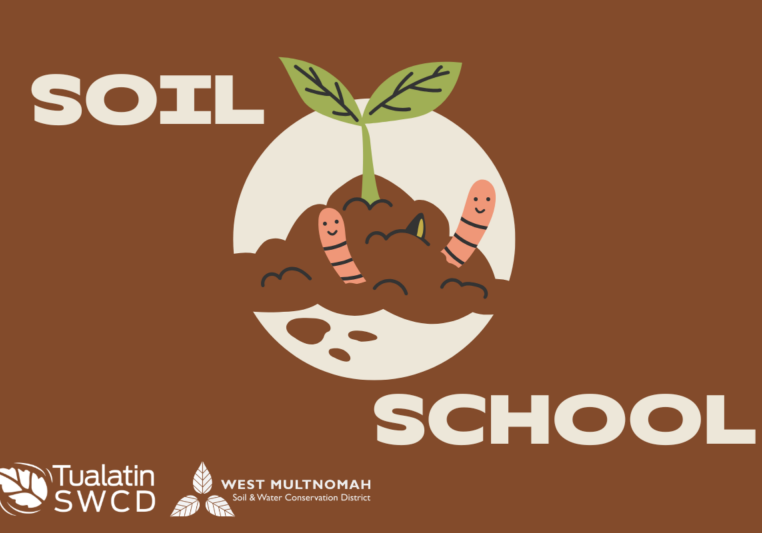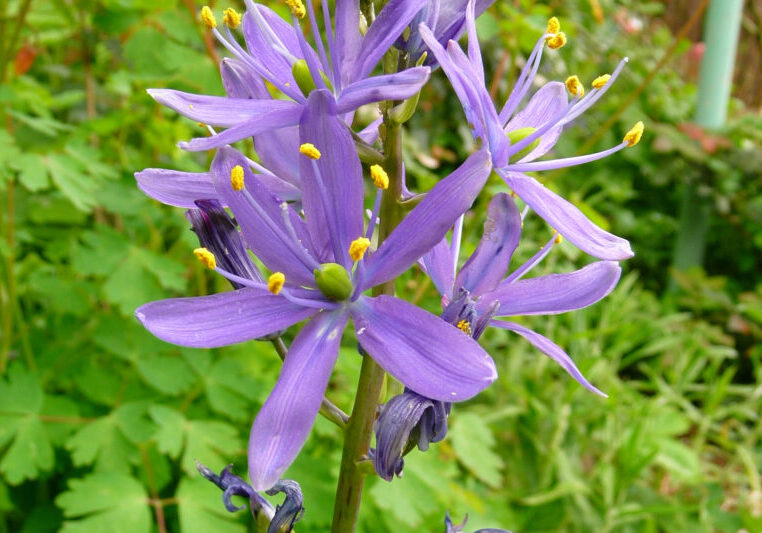Working Farms, Forests & Gardens
Conservation Priorities
Farms
Sauvie Island offers fertile soil and easy irrigation making it an ideal location for farming. The island has more than 12,000 acres zoned for agriculture, with orchards, nurseries, and vegetable farms producing crops, native and ornamental plants, and trees for local, regional, and national markets.
On Sauvie Island and all across our district, we work with farmers and livestock owners to conserve and protect water, build healthy soil, and provide habitat for pollinators and other wildlife.
-
Improve soil quality and production
-
Manage your mud to improve animal and pasture health
-
Improve irrigation
-
Reduce the use of fertilizers and pesticides
-
Reduce erosion
Resources for farms:
-
Supporting Pollinators On Farmland
Forests
Western Multnomah County offers a bounty of lush native forest land. These forests support a wide array of wildlife and plants, keep our streams flowing clear and cool, support our economy with locally-sourced forest products, improve air quality, and offset climate change by storing carbon and cooling the air.
Maintaining a healthy forest is an important and ongoing responsibility and privilege for forestland owners. A healthy forest is a resilient forest, one that is better able to sustain itself in the face of disease, insect damage, and fire.
-
Forest stewardship planning
-
Tree thinningTree thinning Also called “selective harvest,” this is the practice of removing some but not all trees in a forested area. & health
-
Wildfire risk reduction
-
Forest conservation easements
Resources for maintaining healthy forested lands:
-
Oregon State University Forestry & Natural Resources Extension
-
Oregon State University Extension Service, Tree School
-
Oregon Small Woodlands Association
-
Oregon Tree Farm System
-
Forest Stewardship Council
Gardens
To find out more about installing a new garden, restoring a neglected garden, or financial assistance for gardens.
Gardening is a great way to connect to nature in your own backyard or at a local school or community space. Nearly any outdoor area, from a large yard to a patio container garden, can help attract beneficial insects and provide food for people, pollinators and other wildlife.
We provide information to empower people to discover the joy of gardening, growing food, and naturescaping. For yards one acre or larger, we can recommend which native plants will do best in your yard. We can also identify invasive weeds, and provide stormwater management information and suggestions for improving soil health.
-
Pollinator plants and bloom periods
Feed insects from early spring to late summer. Learn which plants bloom in which color at what time of year.
Download Pollinator Plants & Bloom Periods -
Planting for pollinators
Learn which plants will attract pollinators to your yard.
Read Planting for pollinators -
Meadowscaping
Learn how to convert your lawn to a native meadow.
Meadowscaping Handbook -
Backyard Habitat Certification Program
Eligible for yards one acre or smaller
Visit backyardhabitats.org -
Soil school
Join our soil health workshop for a wide variety of topics for gardeners and those tending small farms
Join us for Soil School -
Invasive species management
Learn how to deal with pests in your garden.
Invasive species management services -
Stormwater Stars
Learn how to manage stormwater onsite through hands-on workshops.
Visit stormwaterstars.org -
Naturescaping Resources
Learn more about how to mimic nature in your garden.
Visit emswcd.org -
Metro Area Master Gardeners
The Metro Area Master Gardeners can answer your questions about a specific plant or garden pest.
Visit extension.oregonstate.edu -
Solve Pest Problems
Consult the Solve Pest Problems website for science-based guidance on effective, low-risk solutions for Pacific Northwest pests, weeds, and invasive species.
Visit solvepestproblems.oregonstate.edu
Learn about native plants in our area. Choose the “right plant for the right place.”
-
Native plants database
-
Native plants for Willamette Valley yards
-
Portland plant list
Resources for Edible Gardens:
-
Growing Gardens
-
Portland Farm & Garden Educators Network
Community and demonstration gardens
Community gardens are a wonderful part of any neighborhood:
-
Help families grow healthy, nutritious, and culturally important foods.
-
Create beautiful productive spaces.
Demonstration gardens inspire people to plant their own gardens:
-
Bring neighbors together.
-
Create beautiful vibrant community spaces.
-
Discover creative plant combinations and clever garden methods.
-
Provide habitat for pollinators.
School gardens
School gardens provide dynamic outdoor classrooms where students gain fun, hands-on experience with a wide range of subjects from science and math to project planning, creative writing, and art.
These gardens also bring the school community together and provide wildlife habitat to birds and pollinators.
We can connect schools to resources, help with planning for a new garden, and provide funding to partners to help with some onsite farm or garden education. Our goal is to support school gardens to thrive long-term.
We also connect teachers with curriculum and professional development training opportunities so that outdoor classrooms can be fully integrated into lesson plans, while meeting the Next Generation Science Standards, the goals of Oregon’s Environmental Literacy Plan, and more.
Resources for school gardens:
-
Oregon Department of Education School Garden Resources
Extensive list of resources including information and grants.
Visit oregon.gov -
Oregon State University Extension Garden Resources
-
Growing Gardens
Related services
Find out if you're in our service area.
Related services to help you with working farms, forests, and garden conservation:
Staff contact
Scott Gall
Farm & Soil Conservationist
Contact me about:
Soil health; Farms and livestock; Equity and inclusionLaura Taylor
Forest Conservationist
Contact me about:
Forest and woodland health; Wildfire risk in rural forests; Plants; Pollinators.


